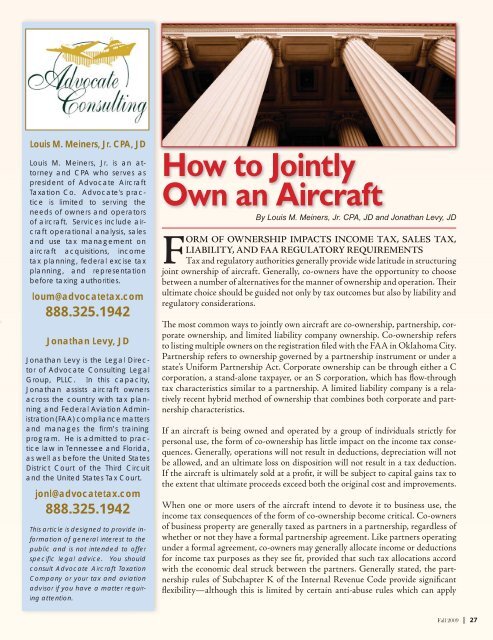800.999.1109 - Aviation Insurance & Risk Management Magazine
800.999.1109 - Aviation Insurance & Risk Management Magazine
800.999.1109 - Aviation Insurance & Risk Management Magazine
You also want an ePaper? Increase the reach of your titles
YUMPU automatically turns print PDFs into web optimized ePapers that Google loves.
Louis M. Meiners, Jr. CPA, JD<br />
Louis M. Meiners, Jr. is an attorney<br />
and CPA who serves as<br />
president of Advocate Aircraft<br />
Taxation Co. Advocate's practice<br />
is limited to serving the<br />
needs of owners and operators<br />
of aircraft. Services include aircraft<br />
operational analysis, sales<br />
and use tax management on<br />
aircraft acquisitions, income<br />
tax planning, federal excise tax<br />
planning, and representation<br />
before taxing authorities.<br />
loum@advocatetax.com<br />
888.325.1942<br />
Jonathan Levy, JD<br />
Jonathan Levy is the Legal Director<br />
of Advocate Consulting Legal<br />
Group, PLLC. In this capacity,<br />
Jonathan assists aircraft owners<br />
across the country with tax planning<br />
and Federal <strong>Aviation</strong> Administration<br />
(FAA) compliance matters<br />
and manages the firm’s training<br />
program. He is admitted to practice<br />
law in Tennessee and Florida,<br />
as well as before the United States<br />
District Court of the Third Circuit<br />
and the United States Tax Court.<br />
jonl@advocatetax.com<br />
888.325.1942<br />
This article is designed to provide information<br />
of general interest to the<br />
public and is not intended to offer<br />
specific legal advice. You should<br />
consult Advocate Aircraft Taxation<br />
Company or your tax and aviation<br />
advisor if you have a matter requiring<br />
attention.<br />
How to Jointly<br />
Own an Aircraft<br />
By Louis M. Meiners, Jr. CPA, JD and Jonathan Levy, JD<br />
FORM OF OWNERSHIP IMPACTS INCOME TAX, SALES TAX,<br />
LIABILITY, AND FAA REGULATORY REQUIREMENTS<br />
Tax and regulatory authorities generally provide wide latitude in structuring<br />
joint ownership of aircraft. Generally, co-owners have the opportunity to choose<br />
between a number of alternatives for the manner of ownership and operation. Th eir<br />
ultimate choice should be guided not only by tax outcomes but also by liability and<br />
regulatory considerations.<br />
Th e most common ways to jointly own aircraft are co-ownership, partnership, corporate<br />
ownership, and limited liability company ownership. Co-ownership refers<br />
to listing multiple owners on the registration fi led with the FAA in Oklahoma City.<br />
Partnership refers to ownership governed by a partnership instrument or under a<br />
state’s Uniform Partnership Act. Corporate ownership can be through either a C<br />
corporation, a stand-alone taxpayer, or an S corporation, which has fl ow-through<br />
tax characteristics similar to a partnership. A limited liability company is a relatively<br />
recent hybrid method of ownership that combines both corporate and partnership<br />
characteristics.<br />
If an aircraft is being owned and operated by a group of individuals strictly for<br />
personal use, the form of co-ownership has little impact on the income tax consequences.<br />
Generally, operations will not result in deductions, depreciation will not<br />
be allowed, and an ultimate loss on disposition will not result in a tax deduction.<br />
If the aircraft is ultimately sold at a profi t, it will be subject to capital gains tax to<br />
the extent that ultimate proceeds exceed both the original cost and improvements.<br />
When one or more users of the aircraft intend to devote it to business use, the<br />
income tax consequences of the form of co-ownership become critical. Co-owners<br />
of business property are generally taxed as partners in a partnership, regardless of<br />
whether or not they have a formal partnership agreement. Like partners operating<br />
under a formal agreement, co-owners may generally allocate income or deductions<br />
for income tax purposes as they see fi t, provided that such tax allocations accord<br />
with the economic deal struck between the partners. Generally stated, the partnership<br />
rules of Subchapter K of the Internal Revenue Code provide signifi cant<br />
fl exibility—although this is limited by certain anti-abuse rules which can apply<br />
Fall 2009 | 27



